No one knew when John Henry Holliday was born that he would die as a legend called “Doc Holliday.” So no one bothered keeping the kind of records that his future chronicler would need to bring his story back to life. The facts that were noted were nothing more than would appear in any old family Bible. But if you mix together the few recorded facts of his life before he became a legend with details of the lives of his family and set it against the background of the Southern world in which he lived, the history begins to look something like a story…
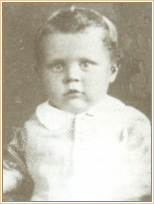 He was born on the 14th of August in 1851 in the little city of Griffin, Georgia. His father, Henry Burroughs Holliday, was a businessman and clerk of the county court. His mother, Alice Jane McKey, was the musically talented oldest daughter of a cotton planter, set to inherit some of her family’s fortune. There was another boy in the Holliday household when John Henry was born — a teenager named Francisco
He was born on the 14th of August in 1851 in the little city of Griffin, Georgia. His father, Henry Burroughs Holliday, was a businessman and clerk of the county court. His mother, Alice Jane McKey, was the musically talented oldest daughter of a cotton planter, set to inherit some of her family’s fortune. There was another boy in the Holliday household when John Henry was born — a teenager named Francisco 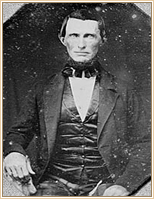 Hidalgo who’d been orphaned during the Mexican War and brought to Georgia by Henry Holliday in his bachelor days.
Hidalgo who’d been orphaned during the Mexican War and brought to Georgia by Henry Holliday in his bachelor days.
Before long there were girls coming to join the family: Alice Jane’s younger sisters Eliza and Ella and Margaret, given into Henry Holliday’s guardianship when their father William Land McKey died. But there were no sisters or brothers for John Henry. His parents’ only other child, a baby girl they named Martha Eleanora, had died six months after her birth and nearly two years before John Henry was born.
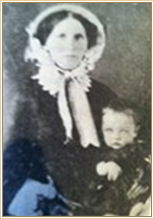 While young John Henry had no siblings, he had plenty of cousins, aunts, and uncles. His uncle Dr. John Stiles Holliday, who lived thirty miles to the west in the town of Fayetteville, had three boys close to John Henry’s age. His uncle Robert Kennedy Holliday, who lived twenty miles to the north in the town of Jonesboro, had eight children — with one daughter, Mattie, said to be John Henry’s childhood sweetheart. His Holliday aunts had children as well, as did his McKey relatives. In a time when family meant everything, John Henry was surrounded by kin.
While young John Henry had no siblings, he had plenty of cousins, aunts, and uncles. His uncle Dr. John Stiles Holliday, who lived thirty miles to the west in the town of Fayetteville, had three boys close to John Henry’s age. His uncle Robert Kennedy Holliday, who lived twenty miles to the north in the town of Jonesboro, had eight children — with one daughter, Mattie, said to be John Henry’s childhood sweetheart. His Holliday aunts had children as well, as did his McKey relatives. In a time when family meant everything, John Henry was surrounded by kin.
But the Civil War scattered the family, as John Henry’s father moved his household to the remote village of Valdosta, close by the Florida border. It was as far south as one could go and still be in the state of Georgia, and became a temporary home for cousin Mattie’s family as well when they became refugees from the Battle of Jonesboro. So for one summer at least, John Henry had cousins close again.
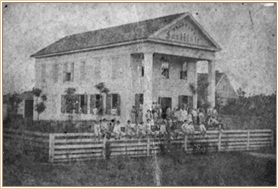 As the War raged on, Valdosta was filled with more refugees – like Professor Samuel M. Varnedoe and his spinster sisters who arrived from Savannah and opened a private school they called the Valdosta Institute. One former student described the curriculum as “the standard one of that time – the classics, mathematics, rhetoric, English composition, and history.” John Henry attended and graduated from the school, his name appearing in class rosters alongside children of some of the other notable families in Valdosta. He must have done well in his studies, because he was admitted to further education at the Pennsylvania College of Dental Surgery when he was only eighteen years of age.
As the War raged on, Valdosta was filled with more refugees – like Professor Samuel M. Varnedoe and his spinster sisters who arrived from Savannah and opened a private school they called the Valdosta Institute. One former student described the curriculum as “the standard one of that time – the classics, mathematics, rhetoric, English composition, and history.” John Henry attended and graduated from the school, his name appearing in class rosters alongside children of some of the other notable families in Valdosta. He must have done well in his studies, because he was admitted to further education at the Pennsylvania College of Dental Surgery when he was only eighteen years of age.
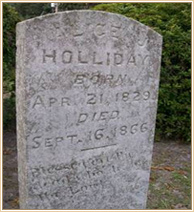 School may have been his refuge when his mother died of a lingering illness. Her obituary doesn’t mention the cause but says that she was confined to her bed for a number of years. According to the reporter, “she was deeply anxious about the faith of her only child,” and had her testimony written down so her son might know her Christian beliefs. There wasn’t much time for mourning, however, for within three months her husband had married again, causing scandal in the town and a lawsuit when the McKeys tried to stop Alice Jane’s inheritance from passing to Henry Holliday. The suit was resolved by a division of her property, with part going back to the McKeys and part going to Henry Holliday in trust until John Henry came of age.
School may have been his refuge when his mother died of a lingering illness. Her obituary doesn’t mention the cause but says that she was confined to her bed for a number of years. According to the reporter, “she was deeply anxious about the faith of her only child,” and had her testimony written down so her son might know her Christian beliefs. There wasn’t much time for mourning, however, for within three months her husband had married again, causing scandal in the town and a lawsuit when the McKeys tried to stop Alice Jane’s inheritance from passing to Henry Holliday. The suit was resolved by a division of her property, with part going back to the McKeys and part going to Henry Holliday in trust until John Henry came of age.
 The War was over by then and Georgia was in and out of Martial Law. Those were troubled days in the South, as Northern politicians made campaign trips looking for voters and the Ku Klux Klan arose to defend the property of the former plantation owners. In the midst of the turmoil, a plot to blow up the county courthouse in Valdosta was discovered – a plot that would have killed a Yankee congressman scheduled to make a speech at the courthouse. Some of the plotters were boys who had been John Henry’s classmates at the Valdosta Institute, and although his name was not on the arrest warrant that took the boys off to a military trial in Savannah, he was quickly sent out of town to spend the summer with his cousins in north Georgia. And that meant spending the summer near his cousin Mattie, who was eighteen years old by then.
The War was over by then and Georgia was in and out of Martial Law. Those were troubled days in the South, as Northern politicians made campaign trips looking for voters and the Ku Klux Klan arose to defend the property of the former plantation owners. In the midst of the turmoil, a plot to blow up the county courthouse in Valdosta was discovered – a plot that would have killed a Yankee congressman scheduled to make a speech at the courthouse. Some of the plotters were boys who had been John Henry’s classmates at the Valdosta Institute, and although his name was not on the arrest warrant that took the boys off to a military trial in Savannah, he was quickly sent out of town to spend the summer with his cousins in north Georgia. And that meant spending the summer near his cousin Mattie, who was eighteen years old by then.
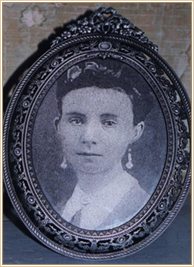 In 1870 he made the long trip by train and sailing ship to the city of Philadelphia to begin his dental training. His coursework was rigorous, including an extensive list of scientific books to be read and clinical procedures to be learned. During the summer between his two years at school, John Henry worked for local Valdosta dentist Dr. Lucian Frink, and is noted on the office records as having pulled and filled several teeth for a former Valdosta Institute classmate, Corinthea Morgan. After his graduation from dental school, John
In 1870 he made the long trip by train and sailing ship to the city of Philadelphia to begin his dental training. His coursework was rigorous, including an extensive list of scientific books to be read and clinical procedures to be learned. During the summer between his two years at school, John Henry worked for local Valdosta dentist Dr. Lucian Frink, and is noted on the office records as having pulled and filled several teeth for a former Valdosta Institute classmate, Corinthea Morgan. After his graduation from dental school, John 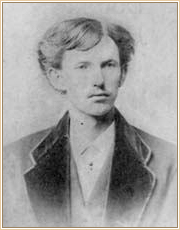 Henry appears to have traveled home by way of the city of St. Louis on the Mississippi River, where his classmate Auguste Jameson Fuches opened a practice. During his short time there, he likely met an actress who would be known later as Kate Elder.
Henry appears to have traveled home by way of the city of St. Louis on the Mississippi River, where his classmate Auguste Jameson Fuches opened a practice. During his short time there, he likely met an actress who would be known later as Kate Elder.
On his return to Georgia, he worked for a time in the Atlanta dental office of Dr. Arthur C. Ford, as shown in an advertisement in the local newspaper. He may have lived during that time at the home of his uncle Dr. John Stiles Holliday, who had moved from Fayetteville to Atlanta after the War. John Henry turned twenty-one years old that summer and came into his inheritance, receiving his portion of his late mother’s family property. He registered his deeds in the county courthouse in Griffin in the fall of that year. 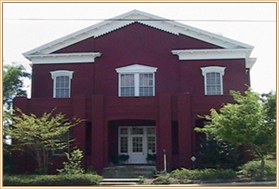 Sometime during that year he is believed to have opened his own dental office in his newly acquired business building on Solomon Street in his hometown of Griffin.
Sometime during that year he is believed to have opened his own dental office in his newly acquired business building on Solomon Street in his hometown of Griffin.
There were two family funerals that winter, marking the passing of his Uncle Robert Holliday, who was buried in Fayetteville, and Francisco Hidalgo, who was buried in Jenkinsburg, near to Griffin. John Henry likely attended both funerals, and soon after sold his Solomon Street property. The historic record does not say when or why he left Georgia, but by the fall of 1873 he was living and practicing in Dallas, Texas.
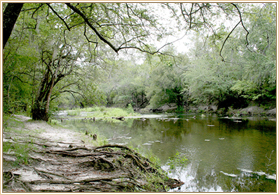 According to a story written by Bat Masterson, who knew him in Dodge City and elsewhere, he left his home state after a shooting on a small river in south Georgia. Masterson says there was a “massacre” but McKey relatives living in the area at the time denied such bloodshed, without denying a shooting. Some say he left Georgia by way of Atlanta, but other evidence suggests a trail through Florida which would have taken him to Texas by way sailing ship to the port of Galveston.
According to a story written by Bat Masterson, who knew him in Dodge City and elsewhere, he left his home state after a shooting on a small river in south Georgia. Masterson says there was a “massacre” but McKey relatives living in the area at the time denied such bloodshed, without denying a shooting. Some say he left Georgia by way of Atlanta, but other evidence suggests a trail through Florida which would have taken him to Texas by way sailing ship to the port of Galveston.
That’s the beginning of Doc’s history as we know it, and just the start of the story told in Southern Son, Dance with the Devil, and Dead Man’s Hand. Follow the links to read more!

